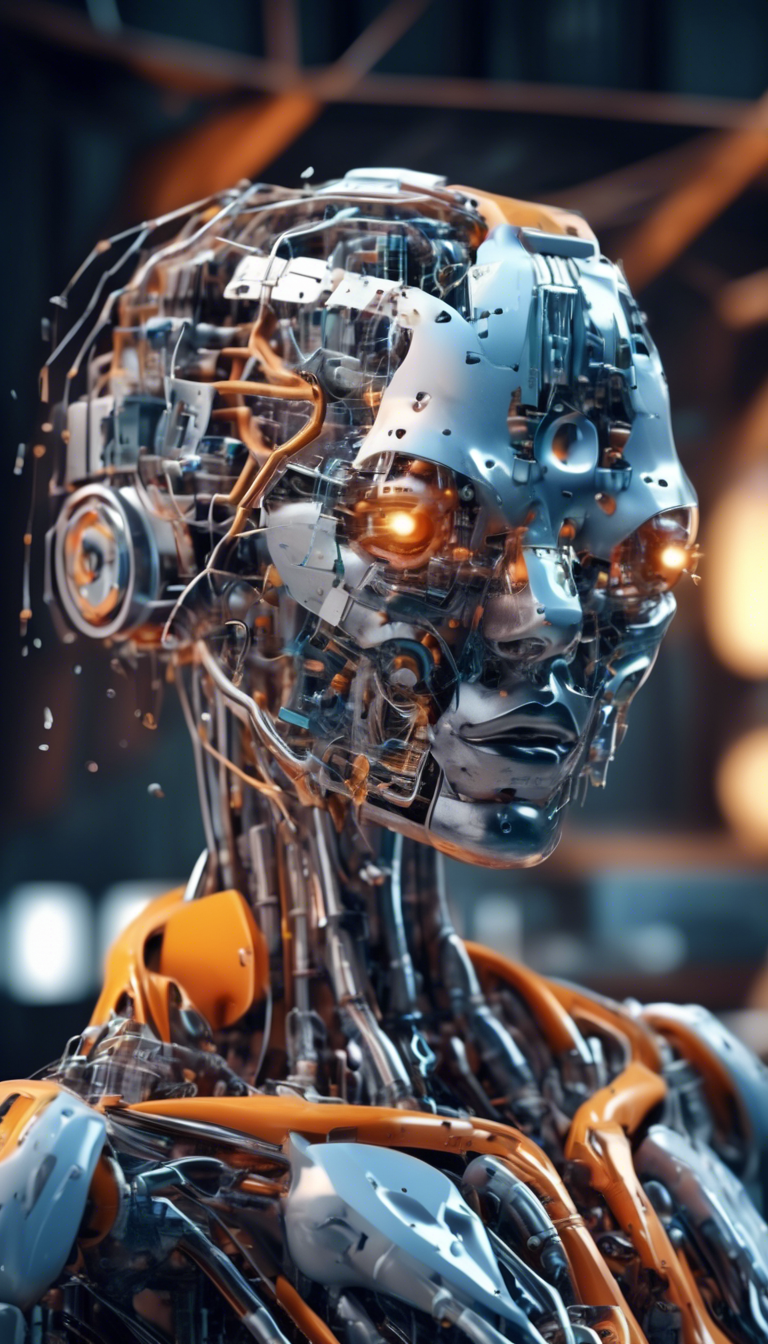The Impact of AI Automated Content Creation on Digital Marketing Strategies
The digital landscape continues to evolve at an exponential pace, and one of the most significant changes is the integration of AI automated content creation into marketing strategies. Businesses are leveraging this technology not just to save time but to enhance their overall content quality and relevance. With the right implementation, companies can reach their target audiences more efficiently while maintaining a personal touch.
AI-generated content can analyze vast amounts of data in seconds. This capability allows marketers to produce tailored content that resonates with specific demographics. By using AI tools to scrape user behavior data, businesses can create highly personalized campaigns that speak directly to their audience’s interests and preferences.
One of the key benefits of AI automated content creation is the speed at which it can generate materials. Companies can produce blog posts, social media updates, and promotional emails in a fraction of the time it would take a human writer. This rapid content generation ensures that businesses stay relevant in a fast-paced market. Speed doesn’t compromise quality either; AI can craft engaging narratives that read naturally, thanks to advanced algorithms that mimic human writing styles.
Moreover, the use of AI tools can enhance a brand’s SEO strategy. AI-driven content creation can help identify trending keywords, monitor audience engagement, and analyze competitors’ performance. Here are some ways AI impacts digital marketing strategies:
- Keyword Optimization: AI tools can suggest phrases and terms that drive traffic, ensuring that content remains relevant and discoverable.
- Content Variation: AI allows marketers to create multiple versions of the same core message, facilitating A/B testing and optimizing strategies based on performance data.
- Consistency: Automated content eliminates the risk of inconsistent brand voice and messaging, leading to a unified approach across all channels.
- Cost-Effective Solutions: By reducing manual labor in content creation, businesses can allocate resources more efficiently and invest in other crucial aspects of their marketing strategies.
In addition to optimizing traditional content, AI can also delve into multimedia. For example, some AI applications can generate images and videos that complement written content. This multimedia engagement significantly boosts user interaction and encourages longer site visits, leading to higher conversion rates.
However, the rise of AI automated content creation does raise valid concerns within the marketing community. The authenticity of brand messaging risks being undermined if businesses over-rely on automation. While AI can replicate human writing styles, it can lack the emotional depth and creativity that truly captivates an audience. Hence, it’s essential for marketers to strike a balance between automated content and genuine human input to maintain connection and authenticity.
Another aspect to consider is the potential for AI-generated content to inadvertently produce misinformation or content that lacks factual accuracy. It’s crucial that human oversight is incorporated into the process to verify the quality and reliability of the content being generated. Deploying AI should enhance human creativity rather than replace it.
To truly harness the power of AI automated content creation, businesses need to embrace a strategic approach. Here are some practices to optimize its effectiveness:
- Integration with Human Writers: Combine AI-generated insights with human creativity to produce authoritative content that resonates on a personal level.
- Continuous Monitoring: Regularly evaluate the performance of AI-generated content to identify success and areas needing improvement.
- Train Your AI: Invest in training AI systems using your brand’s specific voice and style guidelines to ensure a consistent brand message.
- Feedback Loops: Create channels for audience feedback to fine-tune content strategies based on real-world engagement.
As AI technology continues to advance, the impact of automated content creation on digital marketing strategies will only grow. Businesses that effectively integrate AI into their approaches will likely outperform competitors who hesitate to adopt this innovative technology. Ultimately, the future of digital marketing hinges on the harmonious collaboration between intelligent automation and human creativity.
By prioritizing these elements, brands can leverage AI not just as a tool but as a catalyst for growth, community, and engagement in an increasingly digital world.
Balancing Human Touch and AI Efficiency in Content Development
In an era where technology permeates every aspect of our lives, the world of content development is experiencing a significant transformation. The rise of AI automated content creation tools has made it easier and faster to generate large volumes of text. However, blending that efficiency with the human touch in writing is essential for ensuring relevance and emotional connection with the audience. Striking the right balance between these elements can lead to superior content that engages readers while harnessing the power of artificial intelligence.
The Impact of AI on Content Creation
AI-driven tools streamline various aspects of content development, transforming what used to be a time-consuming process into something instantaneous. For instance, businesses and marketers now use AI to:
- Generate blog posts and articles quickly, allowing for frequent content updates.
- Personalize emails and communications based on user behavior and preferences.
- Analyze audience engagement and suggest improvements to writing style and tone.
These capabilities can enhance efficiency, but relying solely on AI can lead to generic content that lacks the unique voice necessary to connect with readers. Therefore, incorporating human insight remains crucial.
Adding Human Touch to AI-Generated Content
When developing content, human writers bring creativity, empathy, and cultural understanding that AI cannot replicate. Here are several strategies to maintain that human connection while leveraging AI:
- Edit AI-generated drafts: Use AI to create initial drafts, but take the time to refine and add a personal touch. This ensures the content feels authentic and resonates with readers.
- Incorporate storytelling: Stories create emotional connections. Whether it’s a customer success story or a narrative that illustrates a key point, weaving personal anecdotes or relatable scenarios into content enhances its impact.
- Understand your audience: Conduct thorough research on your target demographic to tailor content. Utilize AI insights to recognize trends, but combine that data with human intuition about audience preferences.
The Role of Emotion in Content
Emotion is a critical factor in engaging readers effectively. While AI can analyze sentiment in text, it can’t genuinely feel emotions or convey them in a nuanced way. Human writers can incorporate elements that evoke feelings, such as:
- Using relatable language that mirrors the audience’s experiences.
- Employing humor or storytelling techniques that resonate on a personal level.
- Addressing pain points or aspirations, fostering a sense of community and understanding.
This human-centric approach to content allows for a distinctive voice that AI cannot easily replicate, thus fostering stronger connections with readers.
Collaborating with AI in Content Strategy
Rather than viewing AI as a replacement for human creativity, consider it a collaborative partner in the content development process. By integrating both AI and human efforts, you can produce higher-quality content with the following advantages:
- Time savings: AI can automate repetitive tasks, providing writers with more time to focus on creative aspects of content creation.
- Enhanced data insights: AI tools can analyze vast amounts of data to reveal trends and optimize content strategies based on user behavior.
- Improved scalability: AI automation allows businesses to produce large amounts of content for various channels without sacrificing quality.
This synergy can effectively support comprehensive and engaging content strategies that cater to a dynamic audience.
on Harnessing Both Approaches
Balancing human touch and AI efficiency in content development isn’t merely a tactical concern; it involves understanding the intrinsic value each brings to the table. While AI automates and amplifies many aspects of content creation, the human element is what revitalizes it. By leveraging both capabilities strategically, brands can craft content that not only ranks well in search engines but also resonates deeply with readers, fostering genuine engagement and connections.
Conclusion
The landscape of digital marketing is undergoing a significant transformation as AI automated content creation takes center stage. This powerful technology is revolutionizing how brands strategize, communicate, and engage with their audiences. By understanding its impact, businesses can better navigate this new terrain while ensuring that they retain the essence of genuine human connection.
AI’s influence on digital marketing strategies cannot be overstated. From generating blog posts and social media updates to crafting tailored email campaigns, automated tools allow marketers to expedite content production and enhance efficiency. With the ability to analyze vast amounts of data, AI algorithms can identify trends, preferences, and gaps in content, enabling marketers to make informed, data-driven decisions. As a result, businesses can optimize their marketing campaigns to resonate with their audience on a deeper level, increasing engagement and conversion rates.
However, amidst the advantages of AI-driven content creation, it is crucial for marketers to recognize that automation cannot replace human intuition, creativity, and emotional intelligence. The human touch is irreplaceable when it comes to storytelling, brand voice, and empathy. While AI can deliver data-backed insights and produce content quickly, it often lacks the nuanced understanding that a human writer or marketer brings to the table. Striking a balance between AI efficiency and human creativity is essential for creating content that not only informs but also connects with audiences on an emotional level.
One of the ways brands can maintain this balance is by using AI as a supportive tool rather than a complete replacement for human touch. For example, marketers can leverage AI-generated insights to identify topics that are trending or resonate with their audience. Writers can then take those insights and infuse their unique voice and perspective into the content. This collaboration allows for the systematic efficiency of AI while ensuring that the final product remains engaging and relevant—ultimately creating a more authentic connection with readers.
Moreover, the challenge lies not only in balancing AI and human elements but also in understanding the ethical implications of automated content creation. The rise of AI-generated content raises questions about originality, copyright, and the potential for misinformation. Companies must prioritize transparency in how they use AI—and maintain a responsible approach to content creation. By doing so, brands can uphold the integrity of their content while leveraging the efficiency of AI tools. Transparency builds trust with audiences, allowing for a more loyal customer base, which is vital in today’s crowded digital landscape.
As businesses adopt AI automated content creation, their roles will inevitably evolve. Marketers will need to become skilled at interpreting AI-generated insights and seamlessly integrating them into content strategies. The future of marketing may involve a shift toward hybrid teams—where content creators, strategists, and AI systems work together to maximize both efficiency and creativity. This collaboration can unlock new levels of innovation in content marketing, providing brands with a competitive edge in the digital arena.
In the ever-changing world of digital marketing, the integration of AI automated content creation presents both opportunities and challenges. Brands that embrace this trend must be proactive in their approach to maintain authenticity and engage their audience. By leveraging AI for data-driven insights while preserving the human touch in content creation, businesses can thrive in a digital environment that increasingly values personalization and connection.
Ultimately, the art of content marketing hinges on finding the right balance between technology and humanity. As AI continues to evolve, marketers will have to adapt their strategies to incorporate these advancements without sacrificing the core values that define their brand. The companies that succeed will be those that recognize that at the heart of every effective digital marketing strategy lies a compelling story, uniquely told—whether by human or machine. By thoughtfully implementing AI automated content creation and respecting the unquantifiable aspects of human connection, brands can position themselves for long-term success in the digital arena. The journey may be challenging, but the benefits of enhanced engagement, improved efficiency, and deeper connections with audiences make it a worthwhile endeavor.


